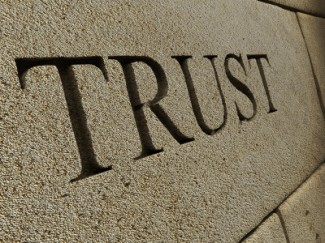 The Great Recession—the deepest economic downturn since the 1930s—created chaos in workplaces everywhere. In the process, the very underpinnings of trust were upended.
The Great Recession—the deepest economic downturn since the 1930s—created chaos in workplaces everywhere. In the process, the very underpinnings of trust were upended.
Today, one-third of working Americans say they plan to look for a new job when the economy gets better and, of this group, 48 percent cite a loss of trust in their employer as the reason, according to the 2010 Ethics & Workplace Survey by consulting firm Deloitte LLP. Furthermore, reveals the survey, as many as 65 percent of Fortune 1000 executives believe that trust will be a factor in the potential increase in voluntary employee turnover in the coming months.
Also, for the first time in recent history, trust and transparency are more important to corporate reputation in the United States than the quality of products and services—a key finding from the 2010 Edelman Trust Barometer, an annual survey on trust and credibility conducted by PR giant Edelman.
And while trust in business is up modestly in the U.S.—after plunging 20 percent in 2009—the rise is tenuous, the Edelman survey reports. CEOs rank next to last on the list of trusted spokespersons, and nearly 70 percent of people worldwide say that companies will revert to “business as usual” after the economy recovers.
Broken trust at work—major and not-so-minor betrayals
Major betrayals in the workplace—from corporations grossly mismanaging worker layoffs to CEOs committing crimes and misdemeanors—can, and these days do, make headlines. To be sure, these breaches of trust are significant and often newsworthy. They do not, however, stand alone.
Minor betrayals, such as gossiping, finger-pointing, or taking credit for others’ work, are more pervasive than major betrayals and erode trust over time. In most workplaces, the accumulation of these “little” betrayals becomes a big problem, negatively impacting people’s confidence, commitment, and energy. What’s more, according to our research, 90 percent of employees report that they feel the effects of eroded trust on a daily basis. Additionally, we know that betrayal is universal: everyone has been betrayed, and everyone has betrayed others.
The high price of not rebuilding trust
Trust—or consequences.
When trust in a workplace remains broken, no one wins. Not individuals. Not teams. Not organizations.
The consequences also come with a high price. On the “hard” side: major hits to productivity, performance, and profits.
And on the soft side? In interviews, employees tell us, “My heart isn’t in this place anymore” or “I just look out for myself.” Team members confess, “We’ve stopped thinking big and taking risks.” And leaders report “a real loss in energy, passion, and creativity.” (Some even sheepishly utter the words, “I hope we make it.”)
Broken trust won’t magically disappear, however, and the process of rebuilding it can’t be short-circuited.
A seven-step process for leaders
Trust is easy to break and hard to repair. Yet, as a leader, in the absence of trust, your vision and objectives are virtually irrelevant.
The good news is that there is a proven seven-step process, drawn from two decades of research, for taking concrete, constructive, and compassionate action.
By practicing these seven steps, you can muster courage, mend broken trust, and move forward with a more engaged and energized workforce.
- 1. Observe and acknowledge what happened. When trust is broken, most people experience the impact as a loss—the loss of what was or what could have been. Tune into how employees are responding to that loss. Acknowledge their experience, listen to what’s important to them, and demonstrate that their views matter. Be sure to interact face-to-face, plus use tangible tools such as organizational surveys and special instruments that measure trust.
- 2. Allow feelings to surface. Provide people with nonthreatening environments to express their feelings and begin to work through them. Focus groups, team meetings, and one-on-one conversations can all be helpful in creating safe, ongoing forums and ensuring that employees’ emotions don’t go underground.
- 3. Get and give support. Help people recognize where they are stuck and how they can shift from blaming to problem solving. Also, make sure that no one is moving ahead blindly. Share key information and insights to help employees feel involved and “in the know.” And seek support for yourself, too, perhaps through fellow leaders, a mentor, or an executive coach.
- 4. Reframe the experience. Put the experience into a larger context. Help people to see the bigger picture, such as the business reasons behind a set of decisions, and to consider the individual choices and opportunities now in front of them, including potential benefits.
- 5. Take responsibility. Own up to what is yours to own. Determine the lessons learned and the actions you can take to improve the current situation. Hold yourself accountable, plus help others take responsibility and hold themselves accountable, too.
- 6. Forgive yourself and others. Forgiving doesn’t mean excusing; it means acknowledging the impact of broken trust and then agreeing not only to move through it but also to learn from it and do better going forward. Ask people, “What needs to happen for forgiveness to take place?” Additionally, ask yourself the same question if you need to forgive yourself.
- 7. Let go and move on. There is a difference between remembering and “hanging on.” Employees may not forget what happened, but they can choose to look forward rather than stay stuck in the past. Help people in letting go and moving on with a sense of shared responsibility.
Dennis S. Reina, Ph.D., and Michelle L. Reina, Ph.D., are pioneering experts on workplace trust and co-authors of Rebuilding Trust in the Workplace (Berrett-Koehler) and Trust and Betrayal in the Workplace (Berrett-Koehler). They are co-founders of the Reina Trust Building Institute, a global enterprise specializing in measuring, developing, and restoring workplace trust. Contact them at reinatrustbuilding.com.




